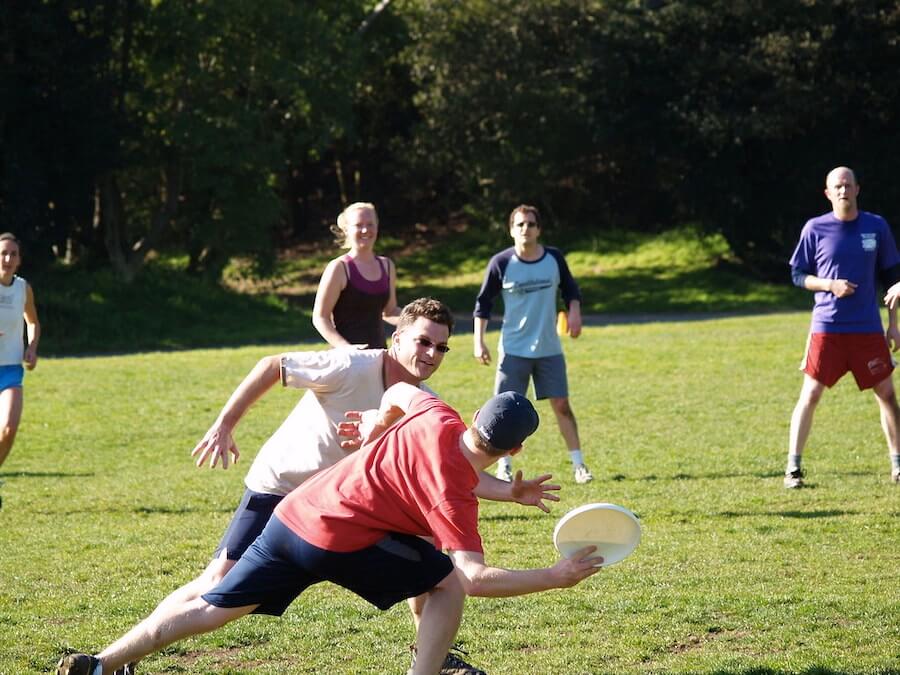Ultimate is a cooperative game that combines aspects of football, rugby, and basketball by using a flying disc as the ball and without a referee.
This game involves several specialized terms to refer to throw types, player positions, or different situations occurring during the match.
This article will give an in-depth explanation of “turnover”. What is a turnover in Ultimate Frisbee?
Let’s scroll down to get into details!
Table of Contents
What Is A Turnover In Ultimate Frisbee?
When will a turnover happen? A turnover occurs when control of the disc is transferred from this team to the other.
A turnover during a match can happen in a variety of different circumstances.
The opposing side may occasionally get control of the disc in certain situations.
Other times, the possession switches hands, and the tournament ends. Who decides whether to call a turnover?
Let’s go into detail regarding the timing of each sort of turnover.
Possession Of The Disc Is Transferred.
A failed pass leads to a turnover. It can happen in several ways.
If the player accidentally falls on the frisbee and cannot take control of it before it lands, the pass is regarded as unsuccessful.
Due to the disc being dropped in this case, the turnover will go to the opposite team.
Nevertheless, if the player manages to grab the dics before it lands, it will not be regarded as a failed pass.
Possession will continue if the thrower drops the disc but quickly catches it to prevent it from hitting the field or other players. In this situation, the match will continue.
In contrast, if the player catches the frisbee after another participant touches it, they will forfeit custody of it if they lose it, even when they can grab it later.
Because it never hits the ground, it is not a turnover. Instead, it is considered a new possession. A turnover sometimes occurs when a pull is dropped.
A dropped pull is one when the attacking team touches the disc but doesn’t manage to capture it.
If this happens, the defending team regains possession of the frisbee.
In addition, a drop happens when the disc hits the ground as a result of a thrower missing its mark or a player missing the catch.
A turnover is also appropriate in either of these situations. The disc being intercepted by a rival player also results in a turnover.
If a thrower attempted to throw the discs to his teammate, but one of the defensive players managed to grab it before his teammate did, the opposing team then took control of the disc.
A turnover sometimes happens when a frisbee leaves the playing area by falling out of boundaries or colliding with something outside the playing area.
Possession Of The Disc Is Transferred, And Play Stops.
If the player fails to throw the frisbee within the permitted 10 seconds, a turnover happens, and the game is over.
An opposing team member counts the time aloud to indicate the seconds the player has had possession of the frisbee as they search for anyone to throw to.
The game will be over when an opposing player hits 10, and their team gets the disc back.
If the player deliberately passes the disc to another member rather than tossing it, it also counts as a turnover with paused play.
The disc must leave one player’s hand before it enters the hands of the other for the throw to be considered legitimate.
The opposite team receives control of the frisbee if this doesn’t happen.
This turnover can also happen if the person throwing the disc catches it.
If a player catches the disc in the air, but before the player grabs it, it isn’t a turnover.
However, when the thrower intentionally tries to deflect the frisbee off of a different player to capture it, the disc flips over, and the tournament is over.
Additionally, the match stops if an attacking player utilizes an instrument or helps a partner complete a catch.
The target receiver of the throw, nevertheless, is given possession if an opposing player helps in catching or utilizing an item to deflect a pass.
When the disc is in game and the player calls a stoppage, competition is terminated if there are no timeouts left.
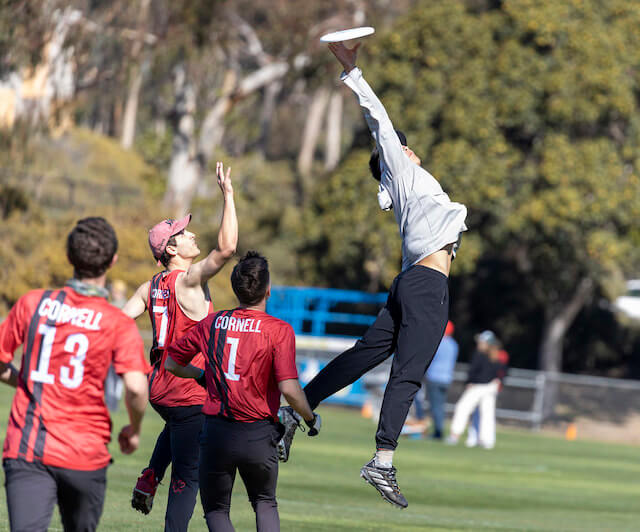
“Spirit Of The Game” In Turnovers
A turnover may happen in the Ultimate game in various ways.
However, it’s noteworthy that the turnover penalties are determined by the participants rather than a referee.
The “spirit of the game” is a characteristic of Ultimate. It fosters a great sense of sportsmanship and respect for one another among the participants.
Players must uphold the highest standards of integrity and fairness when participating under the “spirit of the game.”
Since no official referee exists in Ultimate, the participants self-officiate the tournaments.
Therefore, the players must resolve disputes, out-of-bounds penalties, and fouls among themselves, including turnovers.
Specific turnovers are less noticeable than others, such as when the frisbee is grabbed by a rival player or hits the ground.
For instance, it might be difficult for the other competitors in the game to tell if you stepped slightly within or outside the boundary during a tournament. That’s why the players must be honest.
The players might convene a “contest” to settle their differences over whether a turnover occurred during the match.
They can debate and decide what occurred. The participants must return the disc to the final thrower who wasn’t in dispute if the competitors cannot decide.
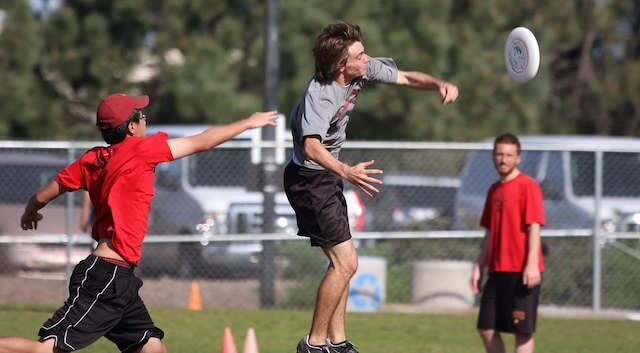
Other Rules In Ultimate Frisbee
Apart from turnovers, this game comes in several rules, as shown below:
Violations
A player commits a violation when they do so without coming into touch with another person.
Any participant who thinks a violation has occurred has the right to call it.
As soon as a violation occurs, the participant must loudly yell “violation” or the term of the particular violation.
Fouls
Physical contact among participating competitors causes fouls.
Usually, the fouled player must call a foul; it is done by shouting the term “Foul!” aloud as soon as the foul has happened.
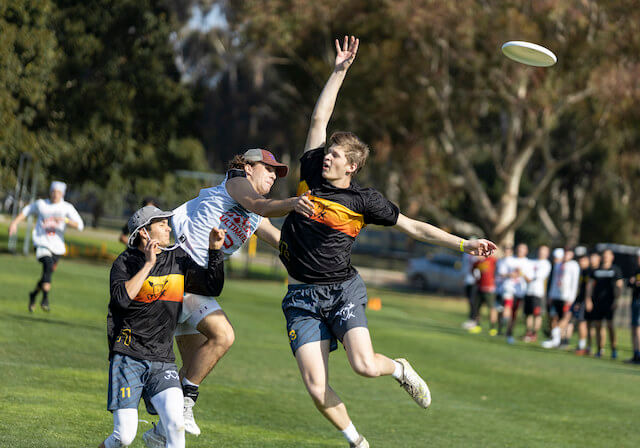
Out-Of-Bounds
Out-of-bounds refers to any space which isn’t on the field of play. The boundaries are forbidden even by themselves.
When a frisbee makes its initial touch with a prohibited region or object, it is outside the boundaries.
Defensive team members may cross out-of-bounds to attempt to catch the disc if it flies out a boundary line and returns to the court.
Whenever a player comes into touch with an area that is off-limits, he is out of bounds.
The location of a player’s last ground touch determines whether they are in or out of bounds when they are in the flight.
Once a receiver has possession of the frisbee, the first contact point with the land must be entirely within the field’s confines.
The participant is regarded as out of bounds if even a little piece of the first contact point is off-limits.
The thrower can pivot in or out of bounds as long as his pivot foot makes contact with the playing surface in some area.
Endzones
The player who obtains control of the ball as a team enters the end zone must decide right once whether to:
- Put the frisbee into space from that location
- Bring it to the nearest spot in the end zone, and then put the frisbee into play.
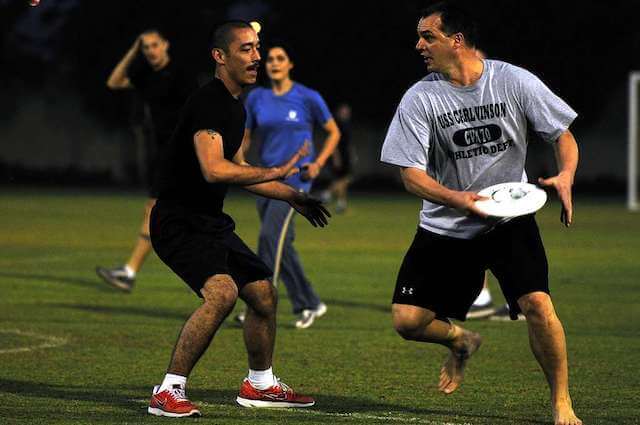
FAQs
How Do Turnovers Work In Ultimate Frisbee?
A turnover occurs if the player still hasn’t thrown the disc after completing the count. The counting must restart whenever the defender changes markers.
What Are Examples Of Turnovers In Ultimate Frisbee?
Here are some examples of turnovers in Ultimate:
- The marker’s counting reaches its maximum number.
- Players pass the frisbee from one to the next.
- The thrower deliberately tries to deflect a pass from another player to himself.
How Much Time Do You Have To Pass The Frisbee Before A Stall Count Turnover?
10 seconds! After the countdown, if the disc hasn’t yet been thrown, it is given to the opposition.
How Far Do You Run In Ultimate Frisbee?
The player runs additional several miles while running approximately 4 miles throughout each 90-minute tournament.
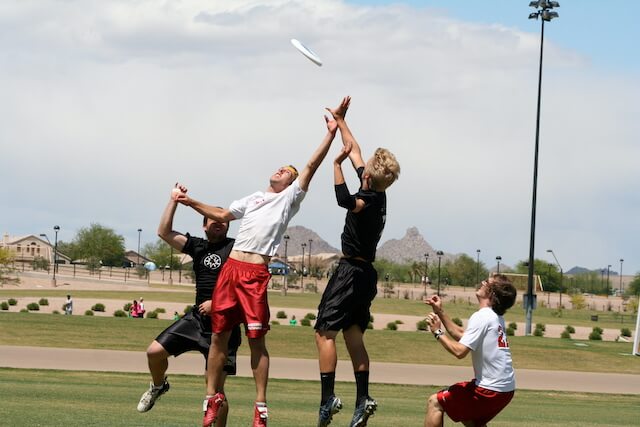
The Bottom Line
What is a turnover in ultimate frisbee? It happens if a pass is dropped, deflected, knocked down, or comes into touch with the out-of-bounds zone.
It will cause a change in possession to occur right away. Besides turnovers, it’s best to learn about other rules in this game.
Hopefully, this article will be helpful for you. If you have further questions, please leave a comment below. Thanks for taking the time to follow us!

